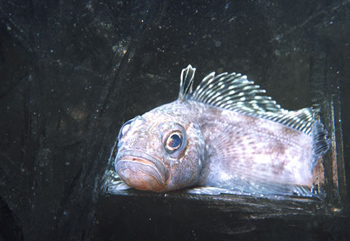The secret of survival in frozen water
Antarctic waters flickered somewhere just above freezing heat, but that did not stop the fish from conquering the cold deep areas.

Resilien fish still survive in the icy waters of Antarctica by securing antifreeze in the pancreas ( Source: LiveScience )
Resilien fish have prevented the body from becoming ice by a special "anticoagulant protein" - preventing their liquid from turning into crystals.
In a recent study, scientists revealed the secret of survival of this fish.
Although the anticoagulant protein (AFGP for short) was first recorded 35 years ago, scientists still do not know how or where fish produce this particular molecule. For many years, they believed that protein secretion occurs in the liver, partly because the liver is known as a famous plant that produces blood proteins.
But recent research when analyzing the tissues of resilien has found that pancreas as well as stomach are the main source of this antifreeze.
" It turns out that the liver has no role in avoiding blood clotting in fish species ," said co-author Christina Cheng of the University of Illinois at Urbana-Champagne.
In the south sea, the seawater temperature rarely exceeds the level of -1.94 degrees C (the freezing point of water) but the solidified fish fluid is about - 1 degree centigrade. small - objects that the fish swallow and can freeze the digestive system from within.
By secreting AFGP into the intestine, where the protein is then absorbed into the blood, the fish prevents its liquid fluids from curing.
The evolution of this ability, according to the researchers, could be motivated by the need to prevent blood in the body from petrification, but also because it allows fish to survive where many other species don't dare to swim. .
T. An
- Survival tips: Escape skills drown when tied up
- Japan has just revived a frozen creature after 30 years
- Frozen frozen fish revived after two seconds into the basin
- The cause of frozen water does not kill goldfish
- The secret should be clear when floating in the open sea
- Video: The secret of survival when lost on the island
- The secret to frozen food in the smartest way
- Filter water with sanitary pads - vital tips when you don't have clean water to use
- 10 secrets to survive and everyone needs to know to help you escape in a narrow distance
- Roll out the outstanding frozen mummification in the world
- Cost $ 90,000 to be frozen in Australia
- The 'unimaginable' way of survival of African aborigines
 Animal 'suffering' after hibernation
Animal 'suffering' after hibernation Why do goats climb well?
Why do goats climb well? Scientists were surprised to see chimpanzees eating turtles
Scientists were surprised to see chimpanzees eating turtles Giant catfish died deadly due to drought in Thailand
Giant catfish died deadly due to drought in Thailand